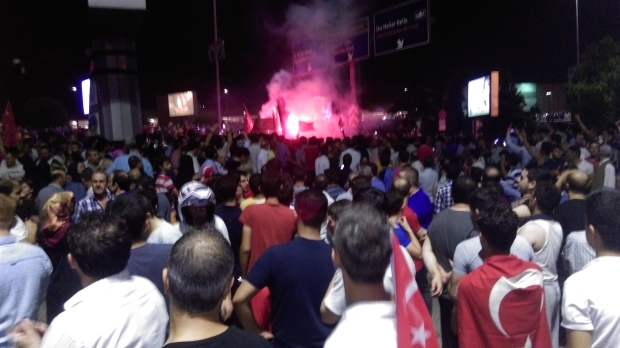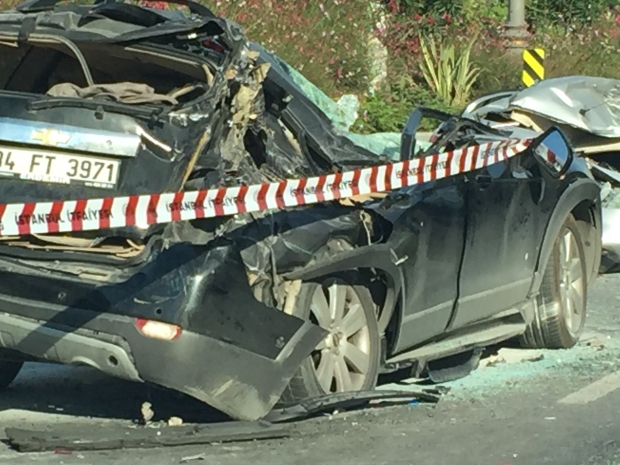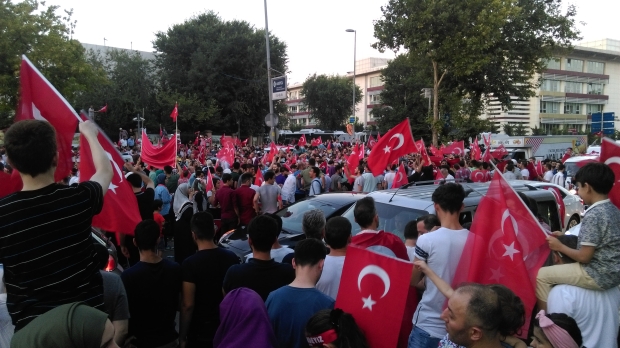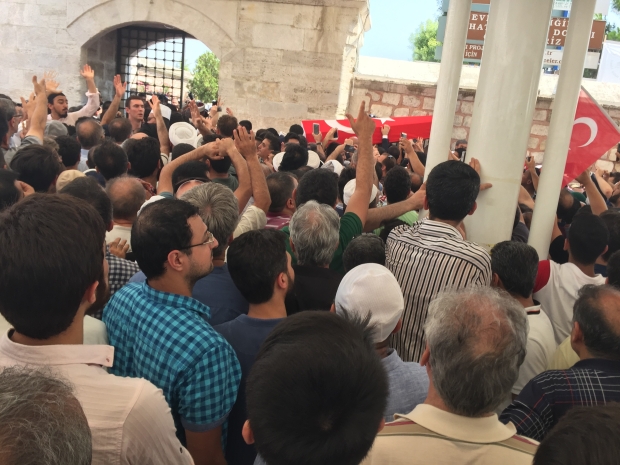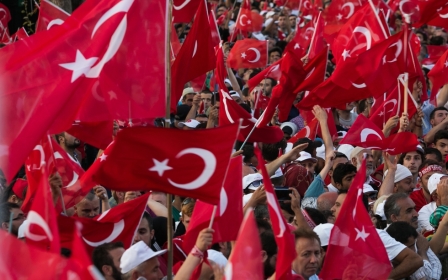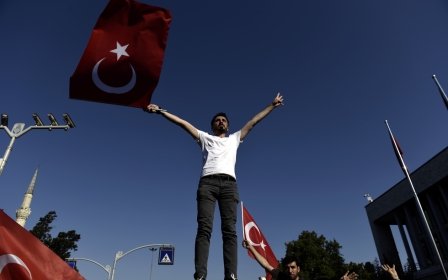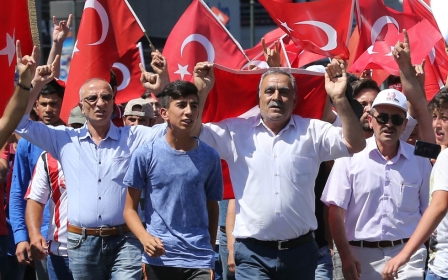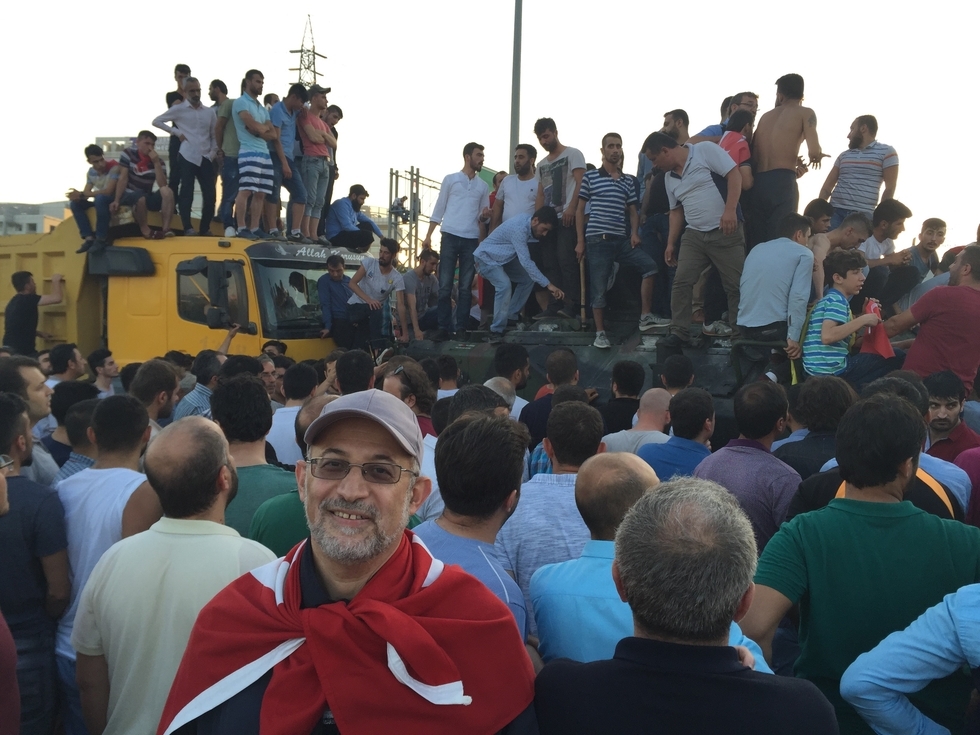
Eyewitness to a coup: How Turkish people power triumphed over brute force
Friday, 15 July, 2016, 10:37 pm
It had been an unusually hectic week since my wife had left for the US to visit our two daughters and grandchildren. I was exhausted from earlier events in the day and was uncharacteristically preparing to go to bed early when the phone rang.
It was a Turkish friend who would not usually have called at so late an hour. He spoke in a rushed but soft voice, so I asked him to slow down, take a breath and speak louder so that I could understand.
He explained that he had reliable information that a military coup was under way in Turkey led by military units loyal to the Gulen movement, in reference to the controversial cleric who is living in self-imposed exile in Pennsylvania. My friend said that the two main bridges over the Bosphorus between the European and Asian sides of Istanbul had already been occupied and closed by military forces, and that major military operations by the coup plotters were taking place in an effort to secure the most strategic locations in Ankara and Istanbul.
He ended the call by warning me to be careful since in such circumstances foreigners could become easy targets.
I immediately turned on the TV and looked online for news but there was absolutely nothing about the coup on any network or news source. Not taking any chances, I called some of my expatriate friends to warn them about this troubling development. Though I tried several times, I could not reach my youngest daughter who works as a journalist for a television news network in Istanbul.
10:58 pm
My friend called again with a bleak report about major military advances taking place aimed at occupying major state institutions, including the building of the military general staff, parliament, the presidential palace and other strategic state institutions in Ankara and Istanbul.
He confirmed again that even though the plotters were allegedly Gulenist military officers, the most senior army leadership was not involved, explaining that the Chief of Staff had been detained while the general staff building had been taken over by the coup plotters.
Within a few minutes news about the coup began to trickle in, with initial reports claiming that the army had already ousted the government and was firmly in control, while state officials were on the run.
To my surprise, the first online news report came from the Israeli newspaper Haaretz, while on television, Sky News’ Middle East bureau based in the United Arab Emirates, began providing detailed reports.
Shortly afterwards, major world media outlets presented the coup as having succeeded. Outlets including CNN and Bloomberg gave airtime to analysts that presented the military takeover as a response to the alleged authoritarianism of Turkish President Recep Tayyip Erdogan. One of the earliest tweets on the coup was by the infamous American neo-conservative ideologue Daniel Pipes who praised it openly while attacking the Turkish government and president.
11:17 pm
I finally reached my daughter who told me that her television station had been taken over by soldiers and that staff were ordered to leave, while many of their mobile phones were confiscated. A few minutes later, my friend called again expressing grave concerns regarding the safety of Erdogan who had been vacationing in Marmaris on the Aegean Sea.
At that point, news reports by international and regional media outlets, led by UAE-based satellite channels, presented the coup as a fait accompli and affirmed that the military was in complete control of the country, while falsely reporting that the Turkish President had fled the country and was searching for another country to grant him asylum.
By then, Turkish Prime Minister Bilali Yildirim had issued a statement that a coup was taking place staged by rebellious officers and vowed to defeat it.
However, many observers and supporters of the coup, especially in many Western outlets, as well as Israeli and hostile Arab news organisations, interpreted the defensive statement as a sign of weakness. They doubled down on their assessment of the coup’s imminent victory. Other analysts, especially those who supported Egyptian President President Abdel Fattah al-Sisi ‘s coup in Egypt three years ago, were gloating that Erdogan’s rule was in its last throes.
11:32 pm, 11:50 pm, 12:03 am, 12:13 am and 12:28 am
I received five more calls in succession from my Turkish friend. In the first call he expressed relief that his earlier report that the president may have been captured was erroneous. Relieved, I assured my worried friend that since the president was free, this coup would not prevail.
In his subsequent calls he said that Erdogan would soon appear on television in an address to the nation, after which he reported that the president had called on Turkish citizens to go into the streets, public squares, and airports to defend their democracy from being hijacked. He added that Erdogan would be flying into Istanbul airport.
Finally, my friend said that he was going out to demonstrate at the Bosphorus Bridge, which was closed and occupied by military units at the time, even if it cost him his life. This five-minute appeal by Erdogan to his nation, which he issued via an iPhone in an interview with a TV news anchor, was the spark that unleashed the Turkish people’s power to defeat a military coup.
Saturday, 16 July, 2016, 12:31 am
I called another Turkish friend who lives nearby and told him that I wanted to go to the airport. He responded that he was going there as well. As I was leaving, I looked out my living room window only to see hundreds of cars leaving to answer the call to confront the coup. Within minutes, the cars in the streets were bumper to bumper.
12:56 am
My friend arrived and as we were driving we heard the call to prayer being recited from many mosques. Contrary to many later reports, the mosques did not urge people to go out and demonstrate. We heard the same call to prayer from many mosques on our way to the airport. It was simply a reminder to people that a grave event was taking place. It served as a way to alert people in case they did not know or were asleep.
The airport was 11 kilometres away, but all streets and roads were either blocked or hardly moving because of the thousands of cars in the streets. Since my friend knows the city well, he drove through side streets and alleyways until we were only three kilometres away. We parked on a side street and joined the crowd.
1:48 am
Thousands of people were marching to Ataturk International Airport across at least five lanes: men, women, and children, young and old, religious and secular. They only carried Turkish flags. No pictures, no party banners or partisan slogans. You could feel their anger, passion, courage, confidence and determination. Midway, we saw people surrounding a military tank, as others climbed to its top and tried to open it in order to capture the seven or eight soldiers who were trapped inside.
We also saw several cars that were clearly hit and crushed by the tank. We hoped that no one was injured. As we approached the airport, there were huge LED signs hanging above the road that read: “Army Go Home” and “We Will Protect Our Democracy.”
2:25 am
We finally reached the entrance to the airport where tens of thousands were already gathered and standing in resolve, vowing not to leave until the coup was defeated. While we were monitoring the news on our cell phones and my friend was translating the updates to me, many demonstrators were amazed and pleased that a Palestinian was among those demonstrating against the military takeover.
Many youths were marching with massive Turkish flags above their heads while others carried Ottoman flags and lit bright flares.
3:44 am
Suddenly a massive sound startled the crowd. As people ducked thinking it was a bomb, it turned out to be the sound of two F-16 fighter jets breaking the sound barrier in an effort to scare the crowd. A woman next to me broke down hysterically. As people close by attended to her, they asked for a bottle of water. Luckily I had one, which they poured on the young woman in order to calm her down.
For the next half an hour, the two fighter jets would fly over us in a desperate attempt to disperse the crowd, but the people would not be deterred. Every time the planes would fly over, the crowd would chant, “God is Great!” But the protesters were by no means homogenous in their lifestyle or political outlook. There were many secular Turks in the crowd who were critical of Erdogan and his Justice and Development Party (AKP) but who also despised the idea of a return to a Turkey plagued by military coups.
Soon afterwards, the president arrived at the airport and spoke from inside the building. As he spoke on live television, he assured the nation that the coup was collapsing and was being defeated.
4:40 am
After the dawn prayers, we received several reassuring reports that pro-coup troops were surrendering to the police, and that state security forces and army units loyal to the government were back in control. As the sun began to rise, people were relieved that the worst seemed to have passed.
5:32 am
As we started heading back, it was amazing to witness the discipline of the Turkish public. Though people were angry and emotions were high, there were no arguments or fights. There was no litter or garbage lying around. In fact, on our way back there were six rubbish trucks waiting on the side, while a municipality truck handed people water, coffee, tea, and soup.
6:19 am
On our way to the car, we once again passed by the tank we had seen earlier that had been surrounded by the crowd. Now, there was a massive construction truck behind the tank and a police truck in front of it. The crowd was furious at the coup plotters and was trying to pull the soldiers out of the tank. They carried axes, sticks, and rocks.
Several people brought a jack in order to open the tank from the top while others smashed the tank’s thick glass windows. There were two water cannon trucks and several police cars in close proximity. Several police officers pleaded with the crowd to forgive the soldiers, telling them that they had been simply misled by their superiors and believed that they were on a training exercise. The police argued that these were young soldiers with loving mothers waiting for them at home. But the crowd would not budge and even tried to topple the police truck waiting to rescue the soldiers.
6:51 am
Suddenly, the crowd roared as the people who brought the jack were successful in opening the top door of the tank enough to create a small opening. Within minutes the mob lit wood, cloth, plastic bottles, and carton boxes and threw them inside the tank in order to smoke the soldiers out.
The police immediately used water cannon to disperse the mob but with limited success. A helicopter appeared buzzing around the people, while police formed lines and started firing in the air in a combined effort to draw attention away from the rescue operation taking place at both ends of the tank.
Within minutes, the police whisked the soldiers out one by one, as the crowd shouted, cursed at, kicked and hit the hapless soldiers who were covered and protected by police officers. In one instance the crowd was able to snatch a soldier but he was rescued before they could attack him. It was an amazing scene to watch as the police showed great professionalism, restraint, and discipline. Eight soldiers, whom hundreds of people deemed traitors, were rescued without a single citizen being abused or arrested.
7:22 am
As we headed back we saw more than a dozen cars crushed by tanks in Vatan Caddesi, one of Istanbul’s main thoroughfares, where there had been shooting throughout the night between coup soldiers and police until the mutineers were subdued and taken into custody. I arrived home a half hour later exhausted but very relieved.
7:37 pm
Later that evening, my friend picked me up again and we headed back to Vatan Caddesi where people were gathered in front of the municipality building to celebrate their victory over the attempt to hijack their freedom and democracy.
Happiness, relief, and a celebratory mood abounded, as thousands marched, danced, and sang. There were no politicians, public speakers, pictures, or party banners. People from all backgrounds and walks of life carried only Turkish flags and sang patriotic songs. It was an amazing display of people power and resolve, and it gave a genuine sense of victory and accomplishment.
A well-planned but botched coup
Since its colossal failure, it has become fashionable to criticise the coup and describe its plotters as bumbling amateurs. Showing dismay, several former CIA officials including James Woolsey, John McLaughlin, and Robert Baer, none of whom condemned the coup attempt against an indispensable NATO ally, lamented how it was poorly carried out.
But, in fact, the coup was far from incompetent. It was well-planned and could have resulted in far more devastating consequences. The mastermind of the coup was Gen. Akin Ozturk, the former commander of the air force, who was dismissed last year. Ozturk also served two years as Turkey’s military attaché in Israel for two years in the 1990s.
In addition, several generals and high-ranking officers were also involved, including the second, third, and fourth army commanders, the commander of the Incirlik air base (where dozens of NATO’s nuclear bombs are stored) General B.E. Van (who later requested but was denied political asylum by the US embassy) as well as several generals of the regional commands of the special forces.
The most critical part of the plot was to paralyse the military chain of command by simultaneously apprehending the most senior generals in the Turkish Armed Forces, the head of intelligence, as well as the president.
The coup plotters were successful in detaining the Chief of Staff General Hulusi Akar in the general staff building after the coup’s special forces occupied it early on. The heads of the Army, the Special Forces (Gendarmerie), and the Navy were kidnapped and held hostage as well. The commander of the Air Force was also arrested, along with other senior officers, while attending his own daughter’s wedding.
President Erdogan was on vacation, staying at a hotel in Marmaris on the Aegean Sea. He was set to participate on Sunday in a charitable all-star football match that was due to feature Barcelona stars including Lionel Messi, Luis Suarez and Neymar of Barcelona in a side coached by Argentine legend Diego Maradona.
He was able to avert arrest by coup soldiers by a mere few minutes when he received a warning from the Chief of Turkish Intelligence (MIT) Hakan Fidan, that a coup was imminent. This proved to be a key turning point in the confrontation between the plotters and the Turkish government and people.
Soon afterwards, Yildirim announced the coup to the world and vowed to defeat it. The government then immediately appointed the head of the First Army in Istanbul, General Umit Dundar, as the acting chief of staff after he called the governor of Istanbul and the president and pledged to confront the coup officers.
Meanwhile, pro-coup forces dropped several bombs on the parliament building (where more than 100 elected officials had been meeting). They also attacked the intelligence agency headquarters, and private TV stations where Erdogan and other government officials appeared and spoke. In addition, several army units loyal to the coup attacked a number of other buildings, including the AKP’s headquarters in Ankara and Istanbul.
It is noteworthy that when Erdogan addressed the nation, he urged citizens to oppose the military power grab but did not attempt to ask elements of the army itself to intervene since it wasn’t clear how far reaching the coup was.
Even though Dundar was able to take back control of many army units, it was the security forces and police as well the forces belonging to the intelligence services that fought back and forced the surrender and ultimate defeat of the coup forces. In less than six hours, most of coup soldiers were either killed, captured or on the run.
According to the interior ministry, there were 161 civilian casualties and 104 deaths among the coup soldiers, with another 1,400 people injured, mostly in Ankara and Istanbul. State TV stations were restored, and the kidnapped senior military officers were later rescued by special forces and intelligence services. Eight senior coup officers fled to Greece via a helicopter. The Turkish government is seeking their arrest and extradition.
The day after the coup attempt, it was evident that the plot was wide and deep, and involved more than 40 generals and dozens of colonels and other high-ranking officers. Members of the judiciary were also accused of involvement, with about 2,800 members of the military, 2,745 judges and prosecutors, and hundreds of other officials among those arrested.
The government’s official line is that the coup plotters were loyal to the Gulenist movement. But the far-reaching arrests of thousands of conspirators point to much deeper involvement within Turkey’s military and bureaucracy. Consequently, according to senior officials within the government, the coup’s defeat is affording it a rare opportunity to restructure and rebuild the military and judiciary, which have acted for decades as impediments to creating fully democratic institutions.
The Gulenist movement and the coup
Even though it appears that many actors were involved, the Turkish people and government are convinced that the core group of the coup plotters was loyal to the Gulenist movement.
This movement is an entrenched secret society that controls massive resources and institutions, including schools, charities, businesses, think tanks, newspapers, TV stations, banks, and many other institutions.
It refuses to be engaged directly in politics but according to its critics asks its most loyal followers to infiltrate the most important institutions in society, especially within the army, police, and the judiciary. Its head is Fethullah Gulen, a former preacher and religious teacher who has resided in rural Pennsylvania since 1999. His movement has as many as 160 charter schools in the US and many hundreds around the world.
Many observers have been sceptical about the accusations against the movement, since it is mostly involved in educational and charitable projects. But many in the US and elsewhere were also perplexed to learn of the close relationship many of its supporters in the US have with prominent pro-Israeli organisations.
One of those supporters is an imam at Duke University, Abdullah Antepli, who is also the architect of a programme called the Muslim Leadership Initiative (MLI) that aims to take promising American Muslims youth leaders on free trips to Israel in order to make them more sympathetic to the Israeli narrative. Antepli has described himself as a “recovering anti-Semite".
In the aftermath of the Israeli massacre of 10 Turkish citizens on board the Mavi Marmara ship, Gulen gave an interview in which he blamed the victims and absolved the perpetrators of the massacre. Throughout the years, the movement built tight-knit relationships with many pro-Israeli establishment figures in the US, including politicians.
The Gulenists were once tactical allies to Erdogan and the AKP during their first decade in power, for most of which Erdogan served as the country’s prime minister. According to informed sources, they became belligerent over time and in 2013 they demanded that Erdogan appoint their candidate to lead the National Intelligence Service. When Erdogan refused, they started an undeclared war to undermine his rule. This open war exposed the degree to which their supporters infiltrated the police, army, the judiciary, and the media.
In a plot that was later uncovered by the Turkish government, at least 6,000 government officials, including the president and his close associates, were found to be wiretapped, allegedly by Gulenists, and kept under close surveillance. It was then that Erdogan decided to confront the movement that he calls “the parallel structure”.
Many Turkish friends who are neither affiliated with the government nor members of the ruling party told me about the extent of infiltration of this movement in society. While many were educated in their schools and know them intimately, they insist that Gulenists preach that the ends justify the means and that they have no red lines when it comes to achieving their aims. During the early hours of the coup, many Gulenists were gloating about it on social media and when Erdogan called for people to take to the streets, many urged people to stay home and refrain from participation.
Regardless, the overwhelming majority of Turkish citizens believe that the coup was staged by officers loyal to the Gulenist movement, who were on the verge of being dismissed from the armed forces. In the aftermath of the coup, the government promised to bring all the evidence against all the coup plotters and their affiliations into the open.
International reaction: From condemnation to hesitation to tacit approval
It is inconceivable that this elaborate military coup did not have international backers. Although it is not yet clear who the backers might have been, forthcoming investigations by the government may eventually bring this to light. But the international reaction to the coup varied from country to country. Those who consider Erdogan’s Turkey to be a mortal enemy, such as the Syrian and Egyptian governments, were openly gloating during the coup attempt.
Qatar, which is Turkey’s strategic partner in the region, was the first to issue condemnation shortly after Erdogan’s appearance on TV. Saudi Arabia abstained from making any statements until the following day when it became clear that the coup had been rolled back.
Echoing the US and most European countries, the United Arab Emirates equivocated, calling for calm and non-violence without condemning the military takeover. Similarly, Israel, maintained a “prolonged silence”, as Haaretz described it, and waited for 15 hours before denouncing it, by which time it was clear that it had utterly failed.
Iran issued an unequivocal condemnation and said that there was no place for coups d’etat in today’s world. As a member of the United Nations Security Council, Egypt blocked a statement on Sunday that would have condemned the coup and endorsed the Turkish government’s democratic credentials. Following Egypt’s disappointment in the coup’s failure, the Arab League has been totally absent.
During a disastrous press conference in Moscow, US Secretary of State John Kerry neither condemned nor criticised the coup. The White House later issued a statement in President Barack Obama’s name, which condemned the coup and supported the Turkish government.
European countries basically followed the lead of the US, first following Kerry’s equivocation in Moscow, then adopting Obama’s condemnation in Washington. Russia was ambivalent and did not condemn the coup until Sunday, when it was clear that the Turkish government was fully in charge. China was silent until the coup was totally over.
But the hypocrisy of the West is astounding. One day after the coup’s failure, Western officials showed more concern about the fate of the coup plotters than its victims who had yet to be buried. On Monday, the US Secretary of State and European foreign ministers issued a stern warning to the Turkish government against the ongoing crackdown and the reinstitution of the death penalty. When the Turkish government called for Gulen’s extradition, the US appropriately demanded evidence before it would consider the request.
But double standards in Washington and Brussels three days after the coup were on full display. When the US government accused Osama Bin Laden of orchestrating the 9/11 attacks, it demanded that the Taliban extradite him. When the Taliban government in Afghanistan demanded evidence, they were first ignored, then invaded and overthrown.
In the aftermath of a bloody coup, Western officials are almost universally denouncing Turkey for the massive arrests against the alleged coup plotters. But since the US became a surveillance state in the aftermath of the 9/11 attacks, innocent Arabs and Muslims have also been victims of mass arrests.
Thousands were questioned, arrested, or deported without a grumble, let alone protest or condemnation. It seems that one of the direct consequences of the coup is that the Turkish people will now be able to distinguish between their true and fake friends, and to recognise those who wish them ill and sympathise with the coup conspirators.
No power is greater than People Power
There are several important reasons why the coup was ultimately foiled. Even though the plot was elaborate and extensive, it did not involve the top brass of the military as in previous coups. Senior military officials such as intelligence chief Fidan and acting chief of staff Dundar remained loyal to the government. It was their dedication and alertness that marshaled the military and security resources during the coup’s critical hours, which routed the plotters.
Moreover, the Turkish media and political class acted responsibly and demonstrated remarkable maturity. There was also a rare consensus on display from most private media outlets that have in the past been not only critical but also hostile to Erdogan and the AKP. They took a firm stand against the coup and were the conduit by which the president and prime minister were able to address their nation.
All four political parties in the parliament, which hardly agree on anything, showed a rare display of unity and determination, as they were steadfast in their rejection of the coup and support for democracy. They stood their ground in parliament even when its building was being bombarded by fighter jets.
Furthermore, the emphatic leadership of Erdogan was decisive in the defeat of the coup. He was resolute and unperturbed as he addressed the Turkish people and implored them to take to the streets and defend their democracy. Even though many see him as a polarising figure, his charisma, popularity, and leadership qualities are undeniable. It was a grave mistake on the part of the coup plotters and their international backers to underestimate him or his ability to command his people.
But ultimately the credit goes to the Turkish people. It took them only minutes to flood the streets, armed with their national flags and strong determination to defeat and foil the coup. Age, gender, social class, ethnicity, ideology, religiosity, none of that mattered.
Millions of demonstrators vowed not to leave the streets, even if it would take days or weeks, until their democracy was restored and their country freed from the yoke of military coups. In fact, this military coup might be the shortest one in history. The Turkish people ended it and declared victory after only six hours.
Sunday, 17 July, 2016, 2:03 pm
Thousands of people gathered in the historic Fatih Mosque to pray for and remember seven victims of the bloody coup, one of whom was a personal friend of the president.
Erdogan, former President Abdullah Gul, and former Prime Minister Ahmet Davutoglu led the mourners in commemorating the sacrifices of the dozens whom Erdogan described as the “martyrs of democracy”. He acknowledged the enormity of the moment and concluded by telling his people: “There is no power higher than the power of the people.”
Dr. Sami Al-Arian is a Palestinian academic and intellectual. He lived for four decades in the US before relocating to Turkey in 2015. Because of his long activism for the Palestinian cause and defending human and civil rights, he was a political prisoner in the US and spent over a decade in prison or under house arrest until the charges were dropped in 2014.
The views expressed in this article belong to the author and do not necessarily reflect the editorial policy of Middle East Eye.
Photo: Sami Al-Arian, the author of this piece, poses in the foreground as protesters attempt to break into a tank (MEE/Sami Al-Arian).
Middle East Eye propose une couverture et une analyse indépendantes et incomparables du Moyen-Orient, de l’Afrique du Nord et d’autres régions du monde. Pour en savoir plus sur la reprise de ce contenu et les frais qui s’appliquent, veuillez remplir ce formulaire [en anglais]. Pour en savoir plus sur MEE, cliquez ici [en anglais].


